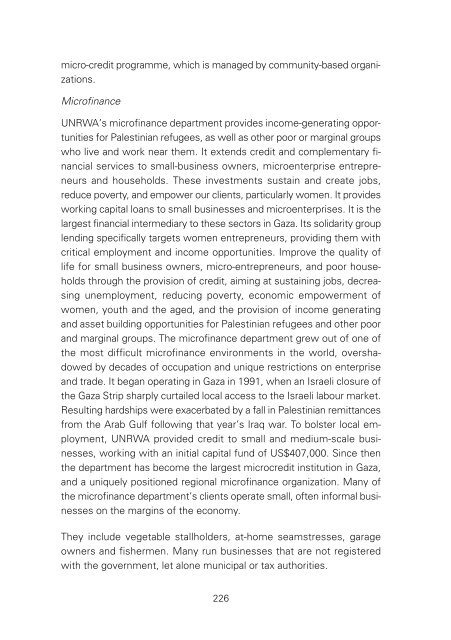The Contribution of Women to Peace and Reconciliation
The Contribution of Women to Peace and Reconciliation
The Contribution of Women to Peace and Reconciliation
You also want an ePaper? Increase the reach of your titles
YUMPU automatically turns print PDFs into web optimized ePapers that Google loves.
micro-credit programme, which is managed by community-based organizations.<br />
Micr<strong>of</strong>inance<br />
UNRWA’s micr<strong>of</strong>inance department provides income-generating opportunities<br />
for Palestinian refugees, as well as other poor or marginal groups<br />
who live <strong>and</strong> work near them. It extends credit <strong>and</strong> complementary financial<br />
services <strong>to</strong> small-business owners, microenterprise entrepreneurs<br />
<strong>and</strong> households. <strong>The</strong>se investments sustain <strong>and</strong> create jobs,<br />
reduce poverty, <strong>and</strong> empower our clients, particularly women. It pro vides<br />
working capital loans <strong>to</strong> small businesses <strong>and</strong> microenterprises. It is the<br />
largest financial intermediary <strong>to</strong> these sec<strong>to</strong>rs in Gaza. Its solidarity group<br />
lending specifically targets women entrepreneurs, providing them with<br />
critical employment <strong>and</strong> income opportunities. Improve the quality <strong>of</strong><br />
life for small business owners, micro-entrepreneurs, <strong>and</strong> poor households<br />
through the provision <strong>of</strong> credit, aiming at sustaining jobs, decreasing<br />
unemployment, reducing poverty, economic empowerment <strong>of</strong><br />
women, youth <strong>and</strong> the aged, <strong>and</strong> the provision <strong>of</strong> income generating<br />
<strong>and</strong> asset building opportunities for Palestinian refugees <strong>and</strong> other poor<br />
<strong>and</strong> marginal groups. <strong>The</strong> micr<strong>of</strong>inance department grew out <strong>of</strong> one <strong>of</strong><br />
the most difficult micr<strong>of</strong>inance environments in the world, oversha -<br />
dowed by decades <strong>of</strong> occupation <strong>and</strong> unique restrictions on enterprise<br />
<strong>and</strong> trade. It began operating in Gaza in 1991, when an Israeli closure <strong>of</strong><br />
the Gaza Strip sharply curtailed local access <strong>to</strong> the Israeli labour market.<br />
Resulting hardships were exacerbated by a fall in Palestinian remittances<br />
from the Arab Gulf following that year’s Iraq war. To bolster local employment,<br />
UNRWA provided credit <strong>to</strong> small <strong>and</strong> medium-scale busi -<br />
nesses, working with an initial capital fund <strong>of</strong> US$407,000. Since then<br />
the department has become the largest microcredit institution in Gaza,<br />
<strong>and</strong> a uniquely positioned regional micr<strong>of</strong>inance organization. Many <strong>of</strong><br />
the micr<strong>of</strong>inance department’s clients operate small, <strong>of</strong>ten informal businesses<br />
on the margins <strong>of</strong> the economy.<br />
<strong>The</strong>y include vegetable stallholders, at-home seamstresses, garage<br />
owners <strong>and</strong> fishermen. Many run businesses that are not registered<br />
with the government, let alone municipal or tax authorities.<br />
226








